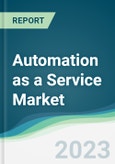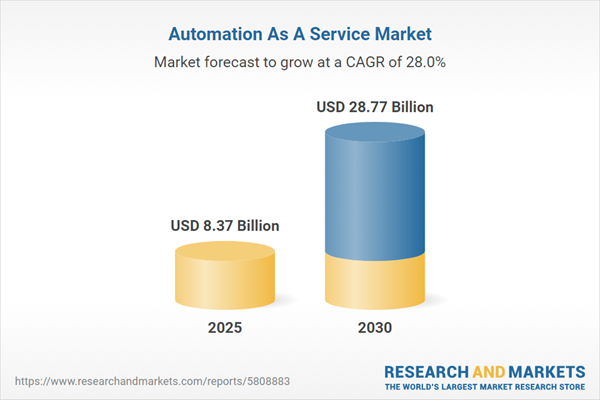The automation as a service (AaaS) market is poised for substantial growth from 2025 onward, driven by advancements in artificial intelligence (AI), machine learning, cloud automation, and the Internet of Things (IoT). AaaS provides structured solutions to automate business processes, tasks, and functionalities across industries, enhancing efficiency and scalability. This report examines key market drivers, geographical trends, and significant developments, offering insights for industry experts navigating this rapidly evolving sector.
Market Drivers
Growing Adoption Across Industries
The increasing integration of automation in end-use industries, from manufacturing to banking and financial services (BFSI), is a primary driver of the AaaS market. The demand for cloud-based solutions and flexible deployment models, such as self-service networks and ‘as-a-service’ platforms, is rising rapidly. Automation streamlines processes like human resources staffing and customer interactions, reducing costs and improving productivity. The focus on DevOps and automated testing, exemplified by investments in platforms like Testsigma, underscores the need for high-quality, accelerated software delivery, further boosting market growth.Rise of Remote Work and AI Integration
The shift toward remote workplaces has amplified the need for automation infrastructure to support distributed teams. AaaS enables companies to manage remote operations efficiently, driving demand for scalable automation solutions. Additionally, the growing adoption of AI enhances automation capabilities, allowing businesses to optimize tasks and reduce expenses. Larger organizations are increasingly deploying AI-driven automation, creating a competitive edge and fueling market expansion.Geographical Outlook
North America: Market Leader
North America, particularly the United States, is expected to hold the largest market share for AaaS due to its robust IT infrastructure and the presence of leading technology vendors. The region is a hub for innovation, with significant investments in AI, robotic process automation (RPA), and cloud technologies. For instance, Tangentia’s July 2023 initiative to deploy AI and RPA solutions for BFSI in Canada highlights the region’s focus on advanced automation. Government initiatives supporting smart city development and digital transformation further strengthen North America’s market dominance.United States: Key Contributor
The U.S. leads the AaaS market, driven by widespread adoption of emerging technologies and a well-established IT ecosystem. Businesses across sectors are leveraging automation and cloud solutions to enhance operational efficiency, supported by regional policies promoting technological innovation. The integration of AI into automation processes, as noted in industry reports, is a significant growth factor, with larger firms prioritizing comprehensive AI deployment to streamline operations.Key Developments
In February 2023, Dynatrace launched its AutomationEngine, a platform leveraging Davis® causal AI and a low-code toolkit to enable answer-driven automation across BizDevSecOps workflows. This development reflects the industry’s shift toward user-friendly, AI-enhanced automation solutionsConclusion
The automation as a service market is set for robust growth from 2025, propelled by the adoption of AI, cloud solutions, and automation across industries. North America, led by the U.S., dominates due to its advanced IT infrastructure and innovation focus, while remote work and DevOps trends amplify demand. Despite challenges like integration complexities, AaaS offers multifold benefits, with ongoing developments in AI and RPA positioning it as a cornerstone of digital transformation for businesses worldwide.Key Benefits of this Report:
- Insightful Analysis: Gain detailed market insights covering major as well as emerging geographical regions, focusing on customer segments, government policies and socio-economic factors, consumer preferences, industry verticals, and other sub-segments.
- Competitive Landscape: Understand the strategic maneuvers employed by key players globally to understand possible market penetration with the correct strategy.
- Market Drivers & Future Trends: Explore the dynamic factors and pivotal market trends and how they will shape future market developments.
- Actionable Recommendations: Utilize the insights to exercise strategic decisions to uncover new business streams and revenues in a dynamic environment.
- Caters to a Wide Audience: Beneficial and cost-effective for startups, research institutions, consultants, SMEs, and large enterprises.
What do businesses use our reports for?
Industry and Market Insights, Opportunity Assessment, Product Demand Forecasting, Market Entry Strategy, Geographical Expansion, Capital Investment Decisions, Regulatory Framework & Implications, New Product Development, Competitive IntelligenceReport Coverage:
- Historical data from 2022 to 2024 & forecast data from 2025 to 2030
- Growth Opportunities, Challenges, Supply Chain Outlook, Regulatory Framework, and Trend Analysis
- Competitive Positioning, Strategies, and Market Share Analysis
- Revenue Growth and Forecast Assessment of segments and regions including countries
- Company Profiling (Strategies, Products, Financial Information, and Key Developments among others).
Segmentation:
By Component
- Service
- Solution
By Platform
- On-Premise
- Cloud-Based
By Organization Size
- Small and Medium-Sized Enterprise
- Large Enterprise
By End-User
- Retail and Consumer Goods
- Manufacturer
- Healthcare and Lifesciences
- BFSI
- Telecom and IT
- Others
By Geography
- North America
- United States
- Canada
- Mexico
- South America
- Brazil
- Argentina
- Others
- Europe
- United Kingdom
- Germany
- France
- Spain
- Others
- Middle East and Africa
- Saudi Arabia
- UAE
- Israel
- Others
- Asia Pacific
- Japan
- China
- India
- South Korea
- Indonesia
- Thailand
- Others
Table of Contents
Companies Mentioned
- Microsoft
- Blue Prism
- HCL Technologies
- IBM
- Automation Anywhere
- Uipath Inc.
- Hewlett Packard Enterprise
- Nice Ltd.
- Kofax Inc.
- Pegasystems
Table Information
| Report Attribute | Details |
|---|---|
| No. of Pages | 155 |
| Published | July 2025 |
| Forecast Period | 2025 - 2030 |
| Estimated Market Value ( USD | $ 8.37 Billion |
| Forecasted Market Value ( USD | $ 28.77 Billion |
| Compound Annual Growth Rate | 28.0% |
| Regions Covered | Global |
| No. of Companies Mentioned | 10 |









